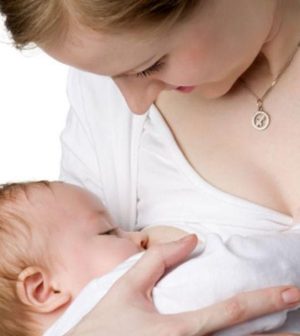- Recognizing the Signs of Hypothyroidism
- 10 Strategies to Overcome Insomnia
- Could Artificial Sweeteners Be Aging the Brain Faster?
- Techniques for Soothing Your Nervous System
- Does the Water in Your House Smell Funny? Here’s Why
- Can a Daily Dose of Apple Cider Vinegar Actually Aid Weight Loss?
- 6 Health Beverages That Can Actually Spike Your Blood Sugar
- Treatment Options for Social Anxiety Disorder
- Understanding the Connection Between Anxiety and Depression
- How Daily Prunes Can Influence Cholesterol and Inflammation
COVID Vaccine Doesn’t Infiltrate Breast Milk

Women who are breastfeeding and wonder if COVID-19 vaccination is safe for their baby may be reassured by the results of a new study.
Researchers at the University of California, San Francisco, report that “vaccine-associated mRNA” — the active components of the Moderna and Pfizer vaccines — “was not detected in 13 milk samples collected 4 to 48 hours after vaccination from 7 breastfeeding individuals.”
While a larger trial is needed to fully confirm the results, the researchers say their findings “provide important early evidence to strengthen current recommendations that vaccine-related mRNA is not transferred to the infant,” so moms don’t have to choose between COVID vaccination and breastfeeding.
Pediatrician Dr. Michael Grosso, who is unconnected to the study, said it “addresses an important safety question,” because breastfeeding women weren’t included in COVID-19 vaccine trials.
“To cause any harm through breast milk, three things all have to be true,” explained Grosso, who is chair of pediatrics at Northwell Health’s Huntington Hospital, in Huntington, N.Y.
“First, some part of the vaccine material would need to end up in breast milk,” he said. “Second, such material would need to be absorbed into the baby’s system [remembering that the very reason most vaccines are injected and not taken orally is that the material is simply broken down in the stomach]. Finally, if present and if absorbed, the vaccine material would need to cause harm.”
Grosso said that most experts had already “agreed that none of these events were likely,” and the new study seems to confirm that.
The research was led by Dr. Stephanie Gaw, of UCSF’s Department of Obstetrics, Gynecology and Reproductive Science. Her team conducted high-tech, detailed analysis of the expressed breast milk of seven lactating mothers who averaged about 38 years of age. Each had received two doses of the Pfizer or Moderna vaccine.
Breast milk samples were tested up to 48 hours after collection. No trace of mRNA from the vaccines was found in any sample.
The San Francisco team noted that if minute amounts of mRNA — far too small to be detected by their tests — still managed to make it to breast milk, this genetic material would “undergo degradation by the infant gastrointestinal system” anyway.
The researchers also noted that the World Health Organization and the Academy of Breastfeeding Medicine both support the safety of maternal vaccination while breastfeeding.
Grosso said other major medical organizations — including the American College of Obstetrics and Gynecology and the American Academy of Pediatrics — also support breastfeeding by vaccinated moms.
“Many other vaccines have been given to breastfeeding mothers in the past, and there are no examples where these have proven harmful,” Grosso added.
The study was published July 6 in JAMA Pediatrics.
More information
Find out more about COVID-19 vaccines for breastfeeding mothers at the American Academy of Pediatrics.
SOURCES: Michael Grosso, MD, chief medical officer and chair, pediatrics, Northwell Health’s Huntington Hospital, Huntington, N.Y.; JAMA Pediatrics, July 6, 2021, online
Source: HealthDay
Copyright © 2026 HealthDay. All rights reserved.










